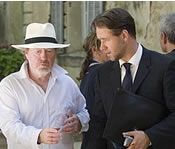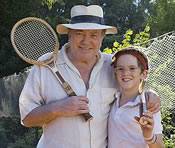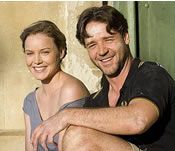
Ridley Scott confers with Russell Crowe on set
Russell Crowe’s latest teaming with Ridley Scott for A Good Year sees him swap sandals and gladiators for Saville Row suits and French wines - it seems that when the director calls he just can't say no.
Russell says: “It’s an incredible privilege for me to be on a Ridley Scott set
“He’s one of the greatest filmmakers ever to exist and for some reason he likes the way I do my part of the gig and keeps wanting me to be on a film with him. He keeps asking me so I’m going to keep saying yes.”
With Gladiator back in back in 2000 and American Gangster out in 2007, A Good Year is the second of three collaborations for the pair. It’s clear the creative friendship is standing up well, but how does that play out on set?
“Ridley gave a quote to a magazine a couple of months ago and he said that he believes we’re both marginally grumpy men,” says Russell. “But that our moods significantly lighten in each other’s company.”
With such an understanding developing between the two it would seem Crowe’s DiCaprio (or DeNiro) has found his Scorsese.
“The depth of communication with Ridley increases over time. Because we know each other, there’s a shorthand," he adds. “I can tell from 50 yards away if he’s crank about something and I can probably work out what I need to do as I’m walking towards him over that 50 yards. I completely accept the role of sidekick or lieutenant with Ridley because he’s a great leader.”
So what creative input did Crowe have on this particular film?
“We were sitting on the set musing that whole, ‘oh bloody hell, mate, we don’t have any battles to fall back on in this one’
“There was this sequence in the movie, an argument that took place amongst the vines, that seemed very standard.
“We already had tennis set up between Henry and the younger Max [Max Skinner, Crowe’s character in the film] so I said, 'what if two middle aged men started sweating and bleeding on the tennis court, would that be enough of a battle for you?'”
Seeing as the film features a comically strenuous battle of wills between Max and his vine-keeper (Didier Bourdon) on the court, it’s safe to say Scott liked the idea.
“It took him a lot longer to grab onto it than I thought it would but then he started to realise.
“What he does is he thinks about something for a while and once he claims an idea it’s like a complete thing and that’s absolutely part of how he now sees everything and he can’t even remember what things were like without it anymore. It’s now completely part of the vision he has in his head.”
 In the film Crowe’s Max Skinner grows up as a child visiting his beloved Uncle Henry - on his vineyard in the south of France - played with aplomb by Albert Finney (pictured left, with Freddie Highmore who plays the young Max). Henry was a character Crowe also helped personally develop.
In the film Crowe’s Max Skinner grows up as a child visiting his beloved Uncle Henry - on his vineyard in the south of France - played with aplomb by Albert Finney (pictured left, with Freddie Highmore who plays the young Max). Henry was a character Crowe also helped personally develop.
“The costuming is a homage to an uncle of mine, David William Crowe,” Russell says. “The cricket vest, the pipe, the cigars, the layered clothing, the blazer, that for me is all my uncle David. He was very much like a Henry character.”
Seeing as Henry is such a significant figure in Max’s early life, and his later renaissance, it seems reasonable to think Crowe’s uncle was equally important to him and the star is quick to agree.
“David was the only person in my family with any acting experience. He was the only one I could go to directly.
"Those little things he said to me, opinions he gave me over time, absolutely shaped the way I view life and get on with my job.”
Quietly animated by talking about his uncle, Crowe begins to speak more freely.
He adds: “One clear example is when I had started to work quite a bit in theatre. There was this attitude in the theatre, and it had been quite definitely said to me on a few times, that you should never give 100 per cent in your performance – because if the audience has seen your 100 per cent in your performance, why would they ever buy another ticket?
“This struck me as being really stupid. But as a lot of sensible theatre people with a lot of credits had been saying it to me, I wanted to find out what my uncle thought.
"He said, ‘Look, the only sort of person who would tell you that is the sort of person who knows you can give more than 100 per cent, that you’re capable of grinding out 110 per cent on a daily basis and it’s never going to bother you because you love doing it and you’re passionate about it’. He said, ‘my advice to you is ignore them and do it your own way’.
"When you’re a young actor there’s not a lot of people you can rely on to talk to you straight and cut through the base paranoia that comes with it.”
As an anecdote it certainly imparts some understanding as to why he prepares for roles as he does, why he has developed such a perfectionist approach. And he doesn't just consider Scott and his uncle to be mentors.
He adds: “Anthony Hopkins I consider a mentor. When I was a young man he said things to me that inspired me, made me very confident.
“The best thing about the mentors I’ve had in my life is how straight they’ve told me about things.”
One way in which Crowe does it ‘his own way’ is by methodically preparing for his roles. Although he seemed slightly tetchier when asked preparation he’d done to play the merciless English market trader Max.
“You’ve got to understand that I don’t do things just for the sake of doing them. If I wanted to fulfil something like A Beautiful Mind there’s a whole bunch of information I need to take in to about what happens in a schizophrenics life. If I’m playing a boxer and I don’t spend six months to a year actually creating that body then you’re not fulfilling the character.”
Straight talking, then. But what about Max?
“There’s a lot of stuff about Max that I already knew, I’d already experienced.
“In life’s big circle I’ve met guys like him, funnily enough when I was researching other films, particularly The Insider when I had to go and find a bunch of corporate sharks. I met a lot of people who remind me of Max Skinner. So I could have spent x amount of time at Bloomberg’s but I didn’t do that as it just wasn’t required.”
 Still, the preparation and mentoring are clearly important themes for Crowe as he continues to mature. Both became evident again when we wound up by discussing his Aussie co-star Abbie Cornish, pictured with Crowe, right. Picked up hot from her excellent performance in druggy romance Candy with Heath Ledger and 2004’s Somersault, this is her first big screen big time, something Crowe was very conscious of.
Still, the preparation and mentoring are clearly important themes for Crowe as he continues to mature. Both became evident again when we wound up by discussing his Aussie co-star Abbie Cornish, pictured with Crowe, right. Picked up hot from her excellent performance in druggy romance Candy with Heath Ledger and 2004’s Somersault, this is her first big screen big time, something Crowe was very conscious of.
“I don’t want to be too much of a wanker about it but just being in that situation, her first major international movie and being on a set for her - if she’s got any problems she knows that she’s got a mate right there.” And perhaps as a mentor, too? “Possibly in a way setting an example of work ethic and gentle leadership.”
“The thing is,” he adds, “Abbie’s got it going on, she’s got all she needs to be successful. So in a way it’s just a privilege for me to work with her when she’s young and sit back and watch her become successful and say, ‘Hey, I worked with that kid once, you know?’”
I wonder if Anthony Hopkins is thinking the same thing now.





















